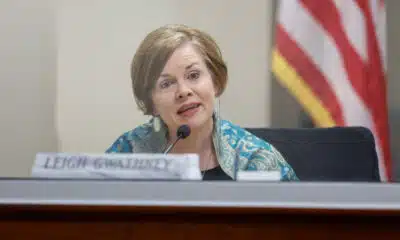News from the South - North Carolina News Feed
preventing Alzheimer’s • Asheville Watchdog
[The following article was originally published by Brevard NewsBeat. Asheville Watchdog is republishing with its permission.]
BREVARD — When retired pediatrician Ora Wells first saw the MRI image showing a large, subcranial void in his parietal lobe — “a f—ing hole in my brain,” he called it — he wasn’t particularly upset.
Mostly he was “amazed,” he said, during last month’s presentation at Brevard College’s Porter Center, re-enacting the scene of first seeing that image and repeating his words of reaction:
“Shazam! . . . Woah! . . . Dang!”
He gave a similarly amused and amusing update on his current symptoms — searching in vain for the name of a common vegetable and carrying a cell phone plastered with the admonition, “Find Me!”
And when he recently got lost on the way to a school he’d visited dozens of times before, he found it not distressing, he said in an interview at a Brevard coffee shop last week, but “interesting.”
So yes, his Alzheimer’s diagnosis is a death sentence, but it’s also a chance to get a close-up view of a disease that is more feared than cancer and afflicts 50 million people worldwide.
He gets to monitor its progress, to study and test the research showing the disease can be prevented and its advance slowed by exercising, eating healthy foods and staying socially engaged.
That intellectual challenge helps him retain cognitive function, he said, as does one more gift in the grim wrapping of Alzheimer’s.
Ask people about Wells and his more than 40 years of nonprofit and medical work, and you tap into a gusher of admiration, words such as “icon,” “brilliant,” “adored” and “hero.”
He shakes his head in embarrassment when he hears this but also says matter of factly that his life has been all about doing everything he can for others. And continuing to do so, he said, is probably the single best way to combat dementia.
If not for his diagnoses, he wouldn’t have this clear mission. He wouldn’t have appeared before a rapt audience of more than 500 on the Porter Center stage, a lively, tartan-clad, and, in case you’re wondering, entirely coherent figure delivering what he says is an essential and hopeful message.
“Your brain health is in your hands,” he told the crowd. “Prevention is in your hands. Restoration is in your hands.”

The motivation of fear
It doesn’t seem strange to Wells that he’s found purpose in the face of potential terror. After all, what’s more frightening than the death of a child?
Nothing, he said, which is why he chose to specialize in pediatrics as a student at the Medical College of Georgia in the late 1970s.
If a dead or permanently injured young person is medicine’s worst possible outcome, he thought, then preventing these things from happening had to be the most gratifying work a doctor could do.
“I was scared of losing kids, so instead of doing family practice, I decided I needed to be an expert in this one thing,” he said. “It was like a moth to flame.”
It never left him, this fear. It’s why, after building the highest level of skill he could as a student and as a medical resident at a hospital in Charlotte, he kept reading studies, attending conferences, consulting colleagues.
It’s why he never failed to heed the concerns of parents about their children’s health. “If you don’t listen to moms, you’re going to get burned,” he said.
If he’s an “excellent diagnostician” — and that’s certainly his reputation — it’s not because he’s brilliant but because he’s “insecure,” he said.
Neonatal emergencies are, of course, especially terrifying, and he once had to talk himself down from a panic attack while driving at 2 am to Pardee Hospital to treat twins born by emergency Cesarean.
But the idea of not responding was even scarier. How many critically ill children wouldn’t make it? How many lives would be diminished from birth?
So after Hendersonville Pediatrics, the practice where Wells was a partner for 41 years, decided it no longer had the resources to handle emergency newborn care, he remained on call to handle such cases — around the clock, including on weekends and holidays, for nearly three years before Transylvania Regional Hospital closed its birthing center in 2015.
“That was such meaningful work for me,” he said, “and I couldn’t tell my OB/GYN colleagues no.”
One of his last cases there was also one of his most harrowing.
A mother’s premature loss of her placenta caused blood to drain from both her and her newborn son, Wells said.
When he arrived at the hospital, the baby was so ghostly white he appeared “translucent,” said Wells, who led a large team of doctors and nurses in the successful battle to save the boy’s life, injecting blood, saline solution and, to restore the baby’s heartbeat, repeated doses of adrenaline.
“Basically, this kid was born dead and hemorrhaged out and we were able to replace his blood loss,” he said.
The boy was transferred to the better-equipped Mission Hospital in Asheville for recovery, Wells said, and doctors there later told him “they weren’t sure they could have saved him.”
He repeats this story not to brag, he says, but to talk about rewards of working with a crew of professionals so in tune with one another “that we could finish each other’s sentences.”
“It was amazing to see the community come together to save that baby’s life,” he said. “We had an extraordinary team.”
All that is true, said Christina Mahoney, who also helped save that child and whom Wells called one of the hospital’s best nurses, but Wells “always led our team and gave direction to everybody on the team.”
He did it with speed and accuracy, with calm and decency to his coworkers, with deep concern for his patients.
“He always had a smile on his face. You never saw him get stressed,” she said. “The families adored him. Patients adored him. The staff adored him. He’s just an icon.”
Charitable works
Wells is also “funny,” said people who know him. He’s an entertaining and self-effacing story teller, they say, a guy who likes to wear Scottish kilts and play bagpipes. They talk about a kindness to children so pronounced that, combined with his long white beard, the Santa Claus comparisons are inevitable.
And if they don’t see the fear, they see the qualities it inspired, the commitment to acquiring and sharing knowledge.
In retirement, for example, he didn’t just decide to volunteer as a reading tutor, he signed up for Augustine Literacy Project-Brevard, the training for which was so intensive, he said, it required him to “sit down next to this fire hydrant and start swallowing.”
Among the many other charitable jobs he’s taken on over the decades is his current role as board president of the community wellness organization, SparkPoint, which hosted his talk.
Though he says he’s just the organization’s “cheerleader,” what that means for staffers is boundless support and “zero micromanagement,” said Executive Director Sarah Hankey.
In fact, she said, SparkPoint probably wouldn’t have gotten off the ground two years ago without Wells’ advocacy and his credibility in the realm of public health.
“He helped us rally for SparkPoint and get a board,” she said. “And because of his good standing and name, a lot of people said, ‘Well, he’s the president. This has got to be something worthwhile.’ ”
He’s taken a far more active role with Consider Haiti, serving on the nonprofit’s board and traveling to the country with its other doctors to treat critically ill children.
Said Bill Allen, an Asheville geneticist who also went on those trips, “Ora was a harder worker than anybody,” not only treating nonstop streams of patients but dutifully following up on their care.
“If he saw a patient that he was worried about,” Allen said, “he might get up at two in the morning and go traipsing around, trying to find that patient’s family and not necessarily knowing where he was going.”
Equally valuable was the “sense of joy he brought to those trips,” Allen said. “Ora’s way of dealing with tough times is through humor, which kind of provides a sense that we can do this as a team.”
Parents loved him, Allen said; so did young patients who, predictably enough, began calling him by their own name for Santa Claus, “Papa Noel.”

Time for a statue?
What’s true in Haiti, is even more true in Brevard, Allen said.
So many grateful patients and parents showed up at Wells’ 2022 retirement party at Oskar Blues Brewery, Allen said, that he had to hike to the event after finding a distant parking space on Old Hendersonville Highway.
Once he arrived, he said, he found his way to the end of “a line of 20 or 30 people waiting with their children to talk to Doctor Ora, some of them in wheelchairs, some of them teenagers, some of them adults who he had seen as children,” he said, “and I think it stayed that way the entire afternoon.”
Scaled-down versions of this scene are repeated so reliably on Wells’ trips to Ingles Market that he calls it “Mingles.”
His coffee shop interview was likewise interrupted by Rebecca Freeman, who stopped by to reminisce about visits to his office with her four children and introduce her preschool grandson to Wells, who, she volunteered, “is the best ever.”
A flood of parents responded to NewsBeat’s request for interviews about Wells, and several of them, including Clare Desmelik, credited him with saving their children’s lives.
Her son, Holmes, was five years old a decade ago when she brought him to Wells’ office complaining of several seemingly disconnected and minor symptoms, including a new habit of holding his head to one side.
Some doctors probably would have dismissed them, she said, but Wells examined Holmes’ eyes “with this huge thing, I don’t even know what you’d call it, but it wasn’t the normal thing that you look at pupils with, and wrote down the word ‘papilledema’ for me.”
It’s the term for pressure on the optic nerve, which Wells said explained the boy’s head tilt and likely indicated a serious root cause, which turned out to be an inoperable tumor deep in his brain.
He immediately referred Holmes to a neuro-ophthalmologist, which led to a prompt diagnosis of his condition and its successful management with care that Wells both helped arrange and provide.
One of his friends, pilot and physician Ruffin Benton, volunteered to fly Holmes at no cost for specialized treatment at a hospital in Philadelphia.
And when Holmes’ compromised immune system left him with a stubbornly persistent wound on his leg and a high susceptibility to infection during the COVID-19 pandemic, Wells provided that rarest of modern medical services — a house call.
Knowing a hospital visit could be fatal, “he came over in like a hazmat suit and did a minor surgery on our front porch, sealing up Holmes’ wound that would not heal,” said Desmelik, whose son is now healthy enough to pitch for Brevard High School’s junior varsity baseball team.
“I mean, he’s a legit hero,” she said of Wells. “I really think Brevard needs to put up a statue of him on a roundabout.”
The informative comedian
So it’s probably not surprising that when news spread of his Alzheimer’s presentation, it generated so much interest that what had been planned as an intimate talk at Transylvania County Library’s Rogow Room had to be moved to the Porter Center.
“This thing blew up,” Wells said.
Also not surprising is one of the reasons that it turned out to be a hit: Wells was initially terrified.
He’s a pediatrician, not a neurologist, he said. And when he went through a shakedown presentation at the SparkPoint office, he said, “It was awful . . . I felt like an impostor.”
But after SparkPoint staffers bucked him up and polished his PowerPoint, he was able to come off as an accomplished comedian who was adept at using props and somehow knew a ton about Alzheimer’s.
A screen above the stage showed a range of factors contributing to the disease, including social isolation, physical inactivity, heavy drinking, smoking and obesity.
If you address all of them, he said, “you can reduce your risk of Alzheimer’s by 45 percent — almost half — regardless of your genetics.”
Because he wasn’t a smoker or much of a drinker, the main path available to him was avoiding the Standard American Diet (acronym SAD), he said, displaying a chart showing only 7 percent of this diet is occupied by fruits and vegetables compared to 51 percent by processed and refined foods.
“This should be turned upside down and backwards,” he said, pointing to the chart.
He always struggled with his weight, he said, drawing laughs remembering the “husky” sized pants he wore as a child and the notably non-ferocious nickname he earned as a high school football player — “Tubby.”
Things got worse when he was a busy doctor, seldom making time for exercise and regularly indulging a weakness for Burger King Whoppers as his weight ballooned to 250 pounds.
“Mid-life Ora was a mess,” he said.
Another temptation was sweets, he said, and after dramatically vanishing from the stage, he reappeared pushing a shopping cart brimming with bags of sugar representing the vast amount consumed annually by the average American.
To illustrate the 50 pounds he dropped after drastically reforming his lifestyle in 2017, he grunted theatrically to remove a bundle from beneath a table and then pulled away a tarp to reveal two 25-pound bags of bird seed.
“This is what I was carrying around for all those years,” he said. “When I was at Lowe’s, I was going to get 50 pounds of manure, but that was a little too close to the truth.”
The inevitable end
He also got laughs from the audience imagining his present-day self placing a warning phone call to “35-year-old Ora.”
But the scene also carried a plaintive implication.
At this point, there’s only so much he can do. Though some studies have shown that improved habits can temporarily reverse the ravages of Alzheimer’s, mostly he can only hope to slow its progress, to ease the “glidepath” to chronic confusion and death.
“I’m not gonna get my brain back,” he said.
He doesn’t worry about this for himself.
“I’ve pushed my chromosomes down for two generations,” he said, referring to his five grandchildren, and both science and his Christian faith tell him that death isn’t destruction but transformation.
“I’ll be part of the energy of the whole universe,” he said. “I ain’t going nowhere . . . I have no fear.”
But he is concerned about what his declining health will mean for three adult children and his wife, Susan, who has her own long history of community service and who devoted herself to their family when he was an often distracted father.
Though his diagnosis was confirmed in November, he and Susan — to avoid ruining Thanksgiving and Christmas — waited until January to share the news with their kids, a meeting at which he warned family members in typically frank terms not to take on the role of caretaker because it leads to social isolation and is a prime Alzheimer’s risk factor.
“I told them that if you’re wiping my a— and I don’t know who you are, stop feeding me. I’ll be gone in a week,” he said.
What this ultimately means: His current mission, just like his work as a pediatrician, is meant to benefit young people. It’s about future generations.
“I’m a day late and a dollar short for prolonging my cognitive reserves,” he said, but “Alzheimer’s is preventable if we go far enough upstream. This talk is for my children and their children.”
Dan DeWitt is the founder of Brevard NewsBeat. He can be reached at brevardnewsbeat@gmail.com.
Asheville Watchdog is a nonprofit news team producing stories that matter to Asheville and Buncombe County. The Watchdog’s local reporting is made possible by donations from the community. To show your support for this vital public service go to avlwatchdog.org/support-our-publication/.
Related
The post preventing Alzheimer’s • Asheville Watchdog appeared first on avlwatchdog.org
News from the South - North Carolina News Feed
AAA travel forecast: Lower gas prices, hit the roads early
SUMMARY: Millions of Americans are expected to travel this July 4th holiday, with Sunday and today being the busiest driving days. AAA estimates a record 61.6 million people will hit the road, urging travelers to leave before noon to avoid heavy traffic between 12 p.m. and 9 p.m. Gas prices offer relief, with summer prices at their lowest since 2021. In Raleigh, gas averages around \$2.93 per gallon, slightly above the state average. Prices in Wilmington and Asheville are about \$2.91 and \$2.90, respectively. Statewide, gas prices have recently decreased by several cents.
Wednesday is the busiest day of road travel before the July 4 holiday, according to AAA.
News from the South - North Carolina News Feed
Population loss in Western NC after Helene expected
In the aftermath of Tropical Storm Helene, some in government and the news media were sounding the alarm on the prospect of population loss in affected areas of the state. The fear that there would be a mass exodus from the North Carolina mountains was contagious.
The storm’s effect on the population will likely not be as dramatic as some imagined, but that doesn’t mean nothing has changed. It’s hard to say, nine months out, what to expect as the situation continues to develop.
But some clues have come into focus.
[Subscribe for FREE to Carolina Public Press’ alerts and weekend roundup newsletters]
State demographer Mike Cline thinks that, in the best-case scenario, the region will lose about 5% of its displaced population. The worst-case scenario could result in population loss as high as 35% among those who have been displaced.
Two factors affecting population were already in play. Families were being priced out of Western North Carolina — and the population has been aging.
Then came Helene. Some lost their homes and were forced to leave. They often had no choice. Some evacuated and never came back. People lost loved ones, pets, cars, businesses and so much more that had tied them to the area.
While most people who left their community will take up residence somewhere else in Western North Carolina, according to Cline, some won’t. Those who do return are likely to be older and have more financial resources than those who do not.
On the other hand, many, many people have stayed put and appear likely to remain where they are.
“When you have a disaster, people want to know immediately what is happening,” Cline told Carolina Public Press. “Most studies show that 65% to 95% of people, depending on the disaster, will return within six months to a year.
“But the data is limited. Most of Western North Carolina’s population live in unincorporated communities or very small towns. When you have a smaller population, it’s harder to track.”
But that doesn’t stop him from trying.
His office formed an ad-hoc subcommittee to meet and discuss the issue of population change post-Helene. They look at housing permits, demolition rates, rehabilitated properties, school enrollments and surveys of local governments.
From there, they can start to get a sense of how many people were displaced and unlikely to return. But they are wary to release anything official until more robust data is available.
Changing population migration patterns
The storm may deter or delay people who were thinking of moving or retiring to Western North Carolina.
“Are the people who were planning to move here actually going to move now?” Cline asked. “That’s where I think the greatest impact in terms of future growth or change will be.”
The region was seen as something of a “climate haven” before Helene, a place where one could be safe from extreme temperatures, sea-level rise and natural disasters, according to Mitchell County resident Lori Gilcrist.
The mountains have lost that status, she says. The chance of something like Helene happening again may decrease the region’s popularity.
It also could be the final straw for someone who was thinking of leaving the region already.
But Gilcrist, for one, said she is not going anywhere.
One factor Cline talks about is the “rootedness” of the region. Even though it’s a popular retirement destination, some families have been there for generations, folks born and raised and still living in the same communities their great-grandparents did.
That Appalachian rootedness may insulate the region from extreme population loss.
Academic aftershocks
But for some populations, like the student population at Appalachian State University in Boone, for example, that rootedness is not really a factor.
“There were a lot of students who had housing problems and real psychological trauma, during and right after the event,” said Colin Kelley, a professor of climate science at App State. “Many had to go home to help their families or deal with their own problems.”
In the Henderson County school system, enrollment dropped by 283 students after the storm.
That number includes families who left the region completely, relocated to a different school district or withdrew their children from school while dealing with the aftermath.
In Buncombe County, eight schools experienced “large losses” in the student body, meaning losses of 20 students or more.
But school officials in Haywood and McDowell County say enrollment numbers have been steadily declining for years, so it’s hard to say how different things would have looked if Helene had not happened.
That’s the prevailing feeling in the Haywood County government as well.
“It’s really difficult to quantify population changes and even more so to attribute any shifts directly to Helene,” said Dillon Huffman, the public information officer for Haywood County.
“From a local government perspective, I don’t know how we associate anything as a direct result of the storm. In fact, I would venture to say that Haywood County has grown in terms of overall population over the past year. One indicator we keep an eye on is building permit activity, which remains strong.
“We won’t have official Census data for another five years, and we’re only nine months out from Helene — it’s tough to establish meaningful trends in such a short window.”
Clarification: This article has been updated to show that the predicted 5% to 35% population loss for Western North Carolina is among just the displaced portion of the population and not the overall population. An earlier version of the article was unclear on that point.
This article first appeared on Carolina Public Press and is republished here under a Creative Commons Attribution-NoDerivatives 4.0 International License.
The post Population loss in Western NC after Helene expected appeared first on carolinapublicpress.org
Note: The following A.I. based commentary is not part of the original article, reproduced above, but is offered in the hopes that it will promote greater media literacy and critical thinking, by making any potential bias more visible to the reader –Staff Editor.
Political Bias Rating: Centrist
This article provides a factual and balanced report on the population impacts following Tropical Storm Helene in Western North Carolina. It relies on data from multiple sources, including state demographers, local officials, and academics, presenting varying perspectives without editorializing or advocating for a specific political viewpoint. The language is neutral, focusing on observed effects and uncertainties without emotional or ideological framing. There is no clear alignment with partisan or ideological stances, reflecting an objective, data-driven approach typical of centrist reporting.
News from the South - North Carolina News Feed
Republicans rewrote the US Senate megabill in its last moments
SUMMARY: Senate Republicans finalized a major bill with last-minute changes addressing Medicaid cuts, rural hospital funding, SNAP costs, and clean energy tax credits. The rural hospital fund was doubled to \$50 billion and payments accelerated to 2026 to offset Medicaid cuts. SNAP provisions allow certain states with high payment error rates to delay sharing program costs until 2029. A clean energy excise tax on solar and wind projects was removed before the vote, while deadlines for energy tax credits were extended to encourage investment. Despite changes, Senators Collins, Tillis, and Paul opposed the bill; Vice President JD Vance broke the tie.
The post Republicans rewrote the US Senate megabill in its last moments appeared first on ncnewsline.com
-
Mississippi Today6 days ago
Defendant in auditor’s ‘second largest’ embezzlement case in history goes free
-
News from the South - Georgia News Feed5 days ago
Are you addicted to ‘fridge cigarettes’? Here’s what the Gen Z term means
-
The Conversation6 days ago
Toxic algae blooms are lasting longer than before in Lake Erie − why that’s a worry for people and pets
-
News from the South - Tennessee News Feed6 days ago
5 teen boys caught on video using two stolen cars during crash-and-grab at Memphis gas station
-
Local News6 days ago
St. Martin trio becomes the first females in Mississippi to sign Flag Football Scholarships
-
Local News6 days ago
Mississippi Power shares resources and tips for lowering energy bill in the summer
-
News from the South - Kentucky News Feed7 days ago
Error that caused Medicaid denials has been corrected, says cabinet in response to auditor letter
-
News from the South - Georgia News Feed7 days ago
GOP mega-bill stuck in US Senate as disputes grow over hospitals and more











































